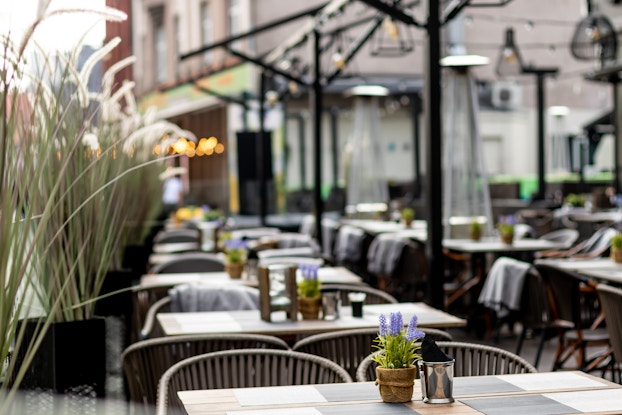
This story was updated on 5/24/21.
Application deadline for SBA’s Restaurant Revitalization Fund (RRF) grant program is this Monday, May 24th at 8pm.
One of the hardest-hit industries during the COVID-19 pandemic has been restaurants, with shutdowns and restrictions cutting off revenue opportunities. The newly passed American Rescue Plan Act (ARPA) aims to help restaurants, bars and related businesses with a new grant program called the Restaurant Revitalization Fund (RRF).
“By our estimates, we've lost $250 billion in revenue from the beginning of the pandemic,” National Restaurant Association Executive Vice President Sean Kennedy said at CO—’s recent Small Business Update event. “From March until January of this year, 110,000 restaurants have been closed. … Our goal has always been an industry-specific solution, and the announcement of the passage of the Restaurant Revitalization Fund is a big step towards that.”
The RRF will offer $28.6 billion in grants to hard-hit restaurants and bars, with restaurants able to apply for grants based on lost revenue. Additionally, $5 billion of that total will be set aside expressly for businesses with 2019 gross receipts of less than $500,000.
Here are four big things restaurants need to know about the RRF grants.
[Visit our full Restaurant Business Strategy Guide for all of our restaurant coverage.]
Who is eligible for RRF grants?
Most American restaurants and bars that lost revenue in 2020 versus 2019 will be eligible to apply for RRF grants. The ARPA explicitly names the following types of establishments that should be eligible: “restaurant, food stand, food truck, food cart, caterer, saloon, inn, tavern, bar, lounge, brewpub, tasting room, taproom, licensed facility or premise of a beverage alcohol producer where the public may taste, sample, or purchase products.”
However, any restaurant or bar that is part of a publicly-traded company or owned by a state or local government is not eligible to apply. Also, owners that operate more than 20 restaurants are ineligible. Notably, if you are the owner of a franchise and you do not control more than 20 locations, you are likely eligible to apply.
How and when can I apply?
The Small Business Administration (SBA) will administer and disperse the RRF grants. To apply, businesses will need to either need to go through point-of-sale (POS) restaurant partners including Clover, NCR Corporation, Square, and Toast, or they can apply directly through the SBA using an application portal. The designated POS partners will be offering their customers an integrated application experience, assistance with documentation, and instructive webinars, aiming to “accelerate” the application process. Registration for the grants will begin Friday, April 30, and applications will open Monday, May 3. (See specifics at top of this story). The application portal will be available here.
Applicants will need to collect and submit documentation to show how hard their business has been hit. Documentation will include tax information verification with the submission of a signed IRS Form 4506-T. Businesses may submit the following documents to prove gross receipts:
- Business tax returns (IRS Form 1120 or IRS 1120-S).
- IRS Forms 1040 Schedule C; IRS Forms 1040 Schedule F.
- For a partnership: partnership’s IRS Form 1065 (including K-1s).
- Bank statements.
- Externally or internally prepared financial statements such as income statements or profit and loss statements.
- Point-of-sale report(s), including IRS Form 1099-K.
Applicants that operate as a brewpub, tasting room, taproom, brewery, winery, distillery, bakery or inn have additional requirements, so be sure to thoroughly review what information is needed from the SBA before the portal goes live. All businesses who want to apply for RRF grants will not need to register with SAM.gov or acquire DUNS or CAGE numbers.
Those interested in obtaining RRF grants should keep a close eye on the SBA’s Restaurant Revitalization Fund website for more details. They can also read over the SBA’s sample application to better know the paperwork and information they need to apply.
Notably, the SBA will run a seven-day pilot period for the RRF application portal, which will be used to address technical problems ahead of the public launch. Pilot-period participants will be randomly selected from businesses with PPP loans in priority groups for RRF, and they will not receive funds until the application portal has opened publicly.
Following the pilot period, the SBA will launch the application portal. For the first 21 days of applications, the SBA will “prioritize reviewing applications from small businesses owned by women, veterans, and socially and economically disadvantaged individuals.” After 21 days, all other applications will be reviewed as they are received.
Our goal has always been an industry-specific solution, and the announcement of the passage of the Restaurant Revitalization Fund is a big step towards that.
Sean Kennedy, EVP, National Restaurant Association
How much can I get from the grant program?
Generally speaking, restaurants can apply for grants that are equal to 2020 gross revenue minus 2019 gross revenue minus PPP loan amounts. For businesses in operation for all of 2019 and 2020, the maximum grant size will be $5 million for restaurants and $10 million for restaurant groups. Grant funds will not be taxed like income.
If a restaurant was not operating for all of 2019, the maximum grant value is the average monthly gross receipts in 2020 minus the average monthly gross receipts in 2019 minus PPP loan amounts. If a restaurant was not in operation for all of 2020, it could potentially receive a grant that totals the amount of “eligible expenses” between February 15, 2020, and March 11, 2021 minus 2020 gross receipts minus PPP loan amounts.
The minimum amount an RRF grant can be is $1,000.
[Visit our full Restaurant Business Strategy Guide for all of our restaurant coverage.]
What can grant funds be used for?
The RRF grants are only able to be used on specific expenses. These include:
- Payroll costs.
- Payments of principal or interest on any mortgage obligation.
- Rent payments, including rent under a lease agreement.
- Utilities.
- Maintenance, including new outdoor seating construction.
- Supplies, including PPE and cleaning materials.
- Food and beverage inventory.
- Covered supplier costs.
- Operational expenses.
- Paid sick leave.
- Any other expense SBA says is essential to maintain operations.
The “covered period” for what expenses can be paid by the grant must be incurred between February 15, 2020, to December. 31, 2021.
CO— aims to bring you inspiration from leading respected experts. However, before making any business decision, you should consult a professional who can advise you based on your individual situation.
Follow us on Instagram for more expert tips & business owners stories.
CO—is committed to helping you start, run and grow your small business. Learn more about the benefits of small business membership in the U.S. Chamber of Commerce, here.










